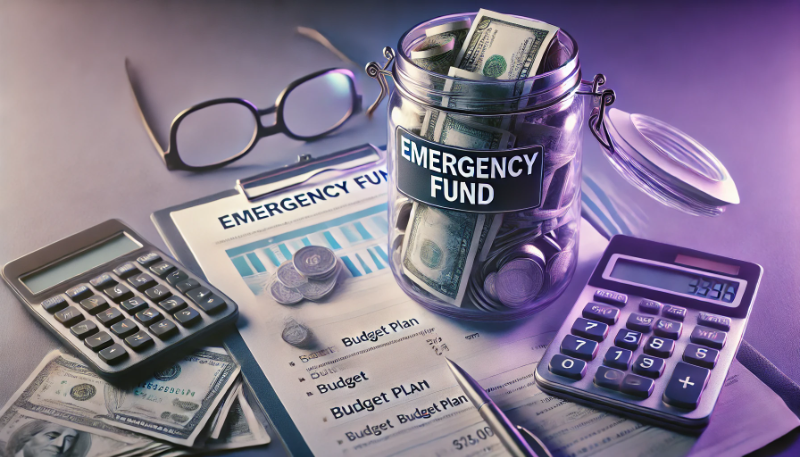One of the key elements of maintaining stable finances is the availability of an emergency fund. It is used for protecting against any unexpected situations, related to healthcare, car accidents, or even losing a job. When there are no emergency funds, most people resort to a way out by committing themselves with huge high-interest credit cards or loans.
This only leads to more tensions in the family as stress levels retain. Provision of an emergency fund creates room for preparedness, peace of mind and the ability to embrace the occurrence of the unplanned. This article takes you through the definition of an emergency fund and effective strategies for building one.
Why an Emergency Fund is Important
Everyone knows that life is full of events for which we are not ready. And one such event is an emergency. Some people would even have enough money saved up, however in the absence of an emergency fund, even something small can turn out to be the last straw. An emergency fund creates a buffer that enables you to make emergency payments without derailing your defined primary goals and objectives.
These are the main reasons why it is important to have an emergency fund:
Avoid Debt: In the event of an unplanned cost, for example a medical expense or car break down, if one is not prepared with emergency funds, they may turn towards credit cards or taking out personal loans.
It may lead to a great deal of debt, with high interest rates on top of it all accumulating after a period of time increasing the financial mess further. An emergency fund will prevent one from going through the cycle of debt.
Maintain Financial Security: The reasons can be many including medicines to be bought immediately, house maintenance to be paid or even losing a job. Having this emergency fund allows one to go through it all, without fixating all of your finances into it.
Reduce Stress: An emergency fund acts as a plan B such that when any unforeseen problems come up, the need to worry about how to settle these expenses goes away. Doing this allows you to concentrate on solving the problem and not think about how you will raise the money to do so.
How Much Should You Save in an Emergency Fund?
An appropriate amount of money to put aside for emergencies varies from person to person, but investment consultants advise establishing an average amount of three to six months’ worth of expenses. This amount is sufficient to take care of core unexpected costs that arise in life such as loss of job or excessive healthcare costs.
Let’s quickly review some things:
Three months’ expenses: Best for an individual or a dual-income family with regular jobs.
Six months’ expenses: Recommended for a single income family, self employed professionals or people with reason to believe that their income can significantly decrease as it might take time for them to bounce back.
List down all the non discretionary kinds of expenses you are incurring each month such as rent or a mortgage, utility bills, food or groceries, insurance, debt payments. Multiply that figure by the number of months (either three or six) by that figure to arrive at the emergency funds figure one needs.
Steps to Save money for Emergencies
Setting aside money for emergencies might leave someone thinking that it is a tall order, but if small amounts are set aside and regularly at that then one can attain their target within a period of time. Do these steps in order to make your fund:
Start with a Small Goal
Saving up to cover a few months worth of expenses will be too much for most people so start with a smaller objective like between $500 and $1,000. This is amount can take care of something like a car repair or a medical bill and hence gives protection against such risks at once.
Automate Savings
Initiate automated payments from your checking account into the account which you have maintained for emergencies. This is the only way one can be assured that money will always be put aside every month without having to remember. Consider this type of savings like you would treat any other kind of liability on a monthly basis.
Eliminate Money-Wasting Expenses
To start with, take a close look at your current bills and try to find some places you can reduce costs. Here, divert what you have saved on eating out, going to events or other subscriptions towards your rainy day savings. Even minor changes can become huge over time.
Use Windfalls Wisely
Well, if you have received some unplanned cash, for instance, your tax refund, yearly bonus or any other gift, just ensure to put some of it into your emergency fund. These windfalls can make a difference in your savings without using your usual income.
Pay off the Debt with the Highest Interest Rate First
If you pay your credit cards every month because the balance is high, then you will need to divide priorities between looking to create an emergency fund and paying off such debt. This means diversifying your extra cash into two goals: savings and debt repayment, for example. For a certain time, pay one half to the emergency fund and the other half to the debt.
Where to Keep Your Emergency Fund
When it comes to storing the emergency fund, the goal will be to make sure it’s relevant but not too easy to access to avoid making unnecessary withdrawals from it. In fact, it would make sense to put the funds in a high-yield savings account. Such accounts generally do not limit the number of withdrawals but still bear a slightly more plug than ordinary accounts, enabling one access to one’s funds in case of unforeseen circumstances.
There is no point in investing the emergency fund either in shares or in other volatile markets as one would come to regret this when the market is not favorable and returns are needed off the savings.
When to Use your Allocate an Emergency Fund
The problem is that no one has any use for emergency funds other than for what they were intended – real emergency situations – sudden and involuntary circumstances. Such expenses include healthcare emergencies, immediate repair of homes and cars and even rent or food costs during unemployment periods. It is not for use in the purchase of unnecessary things or expenses that were already budgeted for such as holidays or doing up the house.
Conclusion
It is very essential to state that setting up and managing an emergency fund is one of the insatiable steps towards attaining security. Even if it will take time to completely fund it, starting off with little and regular contributions will enable you to form that buffer zone that insulates you from the unknown risks in future. Having an emergency fund helps a lot in giving you confidence since you are in control of the circumstances affecting your finances. Make it your focus in your financial plans now and you will definitely withstand any undue hardships in future.
Originally posted 2024-07-17 23:22:01.



